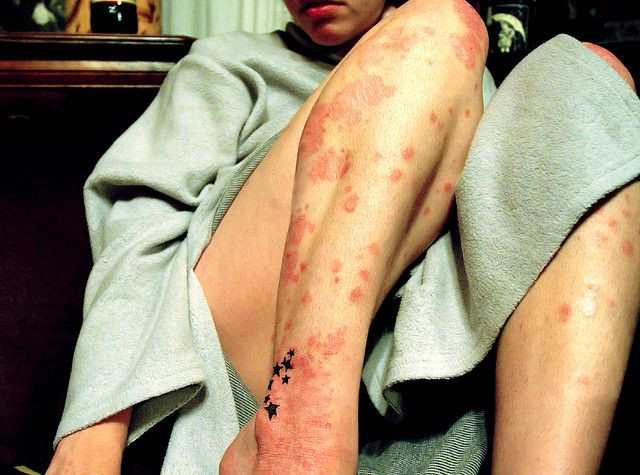Psoriasis Sufferers At Risk For Depression: Skin Condition May Be Linked To Psychological Disorder

People who suffer from psoriasis, even if their condition is relatively less severe, are more likely than others to become depressed, a New York University School of Medicine study finds.
“Psoriasis was significantly associated with major depression, even after adjustment for sex, age, race, body mass index, physical activity, smoking history, alcohol use, history of myocardial infarction, history of stroke, and history of diabetes mellitus,” wrote the authors.
Finding a Cure
Psoriasis is a chronic inflammatory skin condition that affects between 3 and 4 percent of Americans, according to the National Psoriasis Foundation. The condition causes raised, red, scaly patches to appear on the skin, most typically on the elbows, knees, or scalp. It is not contagious. Most often it develops when a person is between the ages of 15 and 35, though the condition can appear at any age. The cause is unknown, though scientists believe both heredity and immunity play a part in its genesis.
Unusually, psoriasis has been linked to heart disease and diabetes. More expectedly, the condition has also been tied to depression. Based on this knowledge, the researchers from NYU addressed a simple question: What, if any, is the relationship between psoriasis and depression?
Dr. Roger S. Ho, department of dermatology, and his co-authors examined data from the National Health and Nutrition Examination Survey from 2009 through 2012. Sifting through the data, the researchers identified 351 (2.8 percent) cases of psoriasis and 968 (7.8 percent) cases of major depression among the 12,382 participants. While the data is extensive, it does not reveal which came first: the depression or the psoriasis.
Analysis indicated 16.5 percent of patients with psoriasis met the criteria for a diagnosis of major depression, yet a history of cardiovascular events did not affect this risk one way or another. Overall, patients with a history of psoriasis had higher average scores than patients without the condition, while the risk of major depression did not differ for patients with limited or extensive psoriasis. Importantly, patients with psoriasis appeared to be more sensitive to depression than others; more of them (23.6 percent) reported their symptoms caused daily functional impairment, whereas only 15.4 percent of patients without psoriasis reported the same.
While so far a cure for this condition eludes scientists, there is still hope, since science continues to advance rapidly and on many fronts at once. On its website, the National Psoriasis Foundation lists clinical trials, which are conducted by scientists attempting to develop new and better treatments for psoriasis patients. Those who participate can gain access to new treatments not yet available on the market, all free of charge.
Source: Cohen BE, Martires KJ, Ho RS. Psoriasis and the Risk of Depression in the US Population: National Health and Nutrition Examination Survey 2009-2012. JAMA Dermatology. 2015.
Published by Medicaldaily.com



























